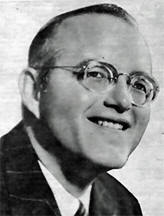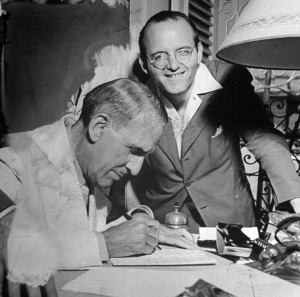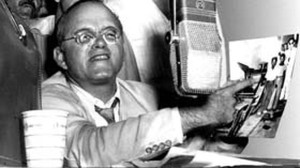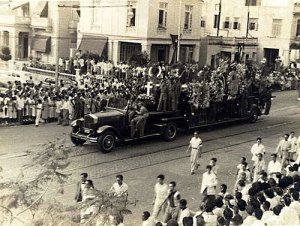 Eduardo René Chibás Ribas born in Santiago de Cuba, capital of the province of Oriente, on August 26, 1907. His father Ing. Eduardo Justo Chibás was of Guantanamo origin. His mother Gloria Ribas Agramonte, was from Camagüey. His uncle was Eduardo Agramonte, Secretary of Foreign Affairs of the Cuban government in the first Independent war.
Eduardo René Chibás Ribas born in Santiago de Cuba, capital of the province of Oriente, on August 26, 1907. His father Ing. Eduardo Justo Chibás was of Guantanamo origin. His mother Gloria Ribas Agramonte, was from Camagüey. His uncle was Eduardo Agramonte, Secretary of Foreign Affairs of the Cuban government in the first Independent war.
He was a Cuban politician who used radio to broadcast his political views to the public. He primarily denounced corruption and gangsterism rampant during the governments of Ramón Grau and Carlos Prío which preceded the Batista era. He believed corruption was the most important problem Cuba faced.
His parents were Eduardo Justo Chibás Guerra and Gloria de Ribas Agramonte.
Enter first at the University of Havana on September 30, 1926. On December 5 of that same year, the student leader Julio Antonio Mella declares hunger strike; Chibás as part of a student protest in Central Park in the capital, begins for him a long series of arrests.
Chibás is considered to have had influence on Fidel Castro’s views but his name is not mentioned in today’s Cuba because he was avowedly anti-communist. However, Fidel Castro wrote an essay praising him, published in the Communist Youth newspaper Juventud Rebelde on August 26, 2007.
Chibás took decisive part in the discussions of the articles of the Constituent Assembly meeting. In one of his propositions military attack Communist Russia against the small nation of Finland pay. In his defense we can cite one of his speeches, “I condemn the imperialist war, condemned the predatory war, condemn war of aggression and celebrate the holy war of the peoples fighting for their independence and freedom” At this preposition opposed the communist delegates, but was passed without their votes.
In 1940 following election is declared elected president Fulgencio Batista, with the backing of the military, the wealthy classes of the nation and a well-paid political machine. In these elections Batista also had the support of the Cuban Communist Party, who was rewarded for his contest, two ministers without portfolio, Carlos Rafael Rodriguez and Juan Marinello.
In 1947 he formed the Ortodoxos party which had the goal of exposing government corruption and bringing about revolutionary change through constitutional means. Castro also joined as he considered Chibás as his mentor. Chibás lost the 1948 election for president, coming in third place. He was an extremely strong critic of that election’s winner, Carlos Prío Socarrás.
On August 5, 1951, Eduardo Chibás walked into radio station CMQ in Havana, for his weekly radio broadcast. That day he had promised to furnish the evidence supporting his claim that education minister Aureliano Sanchez Arango was embezzling money. Instead, he talked about other topics, warned that Fulgencio Batista might attempt a military coup, and made a farewell statement.
Chibás, who was also a senator, was supposed to present evidence from congressmen supporting his claim, who ultimately refused to do so, and Chibás believed that killing himself was the only way he could apologize for his inability to keep his promise. Mr. Chibas shot himself during his weekly radio show; however, he had forgotten that his alloted radio time was only 25 minutes. The shot took place while the commercial ad with “Cafe Pilon” was running, thus, eliminating the planned effect of “his grand finale”.
The whole country grieved for Chibás, who was initially expected to survive, but after eleven days of intensive care, he died in the hospital of his wounds August 16, 1951 in Havana.
He is buried in the Colon Cemetery, Havana. His funeral was attended by hundreds of thousands, and it has been speculated that he might have been a contender for the 1952 presidential elections.
Batista took the government by force on March 10, 1952.
Agencies/Various/Wiki/InternetPhotos/www.thecubanhistory.com
The Cuban History, Hollywood.
Arnoldo Varona, Editor.



 Eduardo R. Chibás, politician, public broadcaster. (born in Santiago de Cuba) ** Eduardo R. Chibás popular político, comunicador radial. (Nacido en Santiago de Cuba)
Eduardo R. Chibás, politician, public broadcaster. (born in Santiago de Cuba) ** Eduardo R. Chibás popular político, comunicador radial. (Nacido en Santiago de Cuba)


